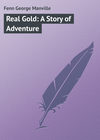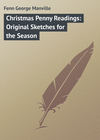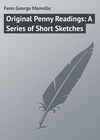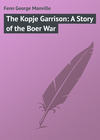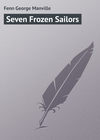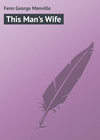Buch lesen: «Jungle and Stream: or, The Adventures of Two Boys in Siam», Seite 5
CHAPTER VII
THE BRINK OF A VOLCANO
The boys were quite wrong in imagining that their act of escaping from the museum had passed unnoticed, for as soon as they had passed out of hearing the doctor nodded his head and threw himself back in his cane chair.
"Now we are alone," he said to Mr. Kenyon, "I may as well tell you what I have heard."
"Nothing serious, I hope?"
"No – yes. It may be either," replied the doctor. "I would not say anything before the boys, for it might make Phra uneasy."
"And Harry?" said Mr. Kenyon.
"No, I think not. I don't believe he would give the matter a second thought."
"You are hard upon the boy," said Mr. Kenyon, rather sternly.
"Not in the least," said the doctor, smiling. "It is his nature. I don't think the matter is really of any consequence, but it would have upset Phra, who is as sensitive as a girl; and he would be worrying himself, and thinking about it for weeks, beside exaggerating the matter on his father's account."
"What is it, then – some trouble with our friend the other king?"
"Friend, eh? I believe that if he could have his own way every European would be driven out of the country – or into the river," he added to himself – "before we were twenty-four hours older."
"What is the fresh trouble, now?"
"Nothing fresh about it, Kenyon. It is the stale old matter. Here we have two parties in the country."
"Yes, and worse still, two kings," interposed Mr. Kenyon.
"Exactly, each having his own party. The one wants to see the country progress and become prosperous and enlightened; the other for it to keep just as it was five hundred years ago; and the worst of it is nearly all the people are on the stand-still side."
"Yes," said Mr. Kenyon. "The old traditions and superstitions suit the indolent nature of the people."
"And the progress the King is making offends their prejudices."
"You mean the prejudices of the bonzes," said Mr. Kenyon sadly.
"Exactly; that is what I do mean, and they are getting so thick with the second king, that I sometimes begin to be afraid that we shall have trouble."
"You have had that idea for a long time now, but the reigning King holds so strong a position that his kinsman dare not rise against him. He is as gentle and amiable a man as could exist, but there is the old Eastern potentate in him still, and our friend number two knows perfectly well that if he attempted to rise he would be pretty well sure to fail, and then his head would fall as surely as if our old Harry the Eighth were on the throne."
"But would he fail? All the bonzes are on his side."
"Yes," said Mr. Kenyon, laughing; "and they'd tell him to go on and prosper, but they would not fight."
"No, they would not fight," said the doctor musingly.
"Do you think there is a regular conspiracy?"
"I really do sometimes, and it makes me uneasy."
"That is because you are a young married man, and fidget about your wife."
"Well, and quite naturally."
"Yes, quite naturally, of course; but when you have been here as long as I have, you will not be so nervous."
"I don't think I am nervous, Kenyon; but it would be very horrible if there should be a rising amongst the people."
"Horrible, but not likely, my dear sir."
"But if there were? I suppose I am right in looking upon ourselves as being favourites."
"Certainly."
"Well, then, should we not be among the first whom the people would attack?"
"That is quite possible, but I suppose we should defend ourselves, and be defended as well by the people who remained staunch."
"I have thought of all that, but if trouble did come it would be sudden and unexpected, and we should be taken by surprise."
"We might be, or we might have ample warning. I think the latter, for these people are very open and wanting in cunning."
"But don't you think we – or say you – having so much influence with the
King, would do wisely if you warned him – told him of our suspicions?"
"No, I think not," said Mr. Kenyon.
"Why?"
"Because, quiet and studious as the King is, he happens to be very acute and observant. I feel certain that nothing goes on in the city without his being fully aware of it; and though he seems to take very little notice, I am pretty sure that nothing important takes place except under his eye, or which is not faithfully reported to him by one or other of his councillors."
"Perhaps you are right," said the doctor, "and I have been unnecessarily nervous."
"I feel sure that you have been. I would speak to him, but he might look upon it as an impertinent interference on my part in connection with private family matters. Take my advice, and let it rest. We should have ample warning and ample protection, I feel sure. But I am glad you spoke out, all the same. But bah! nonsense! You would not be hurt – you, the doctor who has done so much good among the poor people. Why, doctor, they look upon you as something more than man: they idolize you."
"For the few simple cures I have effected."
"Few? Hundreds."
"Well, hundreds, then. But what has it done?"
"Made you friends with every one in the city."
"Made me a number of bitter enemies, sir. Why, the native doctors absolutely hate me. My word! I should not like to be taken ill and become helpless. They'd never let me get well again if they had the doctoring."
"Don't be too hard on them," said Mr. Kenyon.
"Not I, my dear sir. I only speak as I think. So you would not take a step in our defence?"
"Not until we were certain that it was necessary; then as many as you like. Steps? I'd make them good long strides. But say no more: the boys are coming back, and we don't want to set them thinking about such things."
In effect, steps were heard in the verandah, and a few minutes later
Harry hurried into the museum again.
"Well, boy!" cried the doctor. "What is it? you look hot."
"Tiger," said Harry eagerly.
"Where?" cried Mr. Kenyon and his visitor in a breath.
"Over yonder, by the new sugar plantation," cried Harry. "Jumped on a man and killed him. Sree has just heard the news. He told me and Phra."
"How horrible!" said Mr. Kenyon.
"Yes, and the village people sent a messenger to Sree. They want the brute killed, and we're going to have an expedition and destroy the wretch."
"Indeed?" said Mr. Kenyon drily.
"You and Mr. Cameron will come with us, of course, father?" said Harry, who was too much excited to notice the glances exchanged between the merchant and his visitor; "but I should like to have first shot, and kill the beast."
"No doubt," said the doctor drily; "but I suppose you would not wish us to give up our chances if the tiger came out our way?"
"Oh no, of course not," said Harry. Then turning to Mr. Kenyon, "You will try the new rifles the King sent to you, will you not, father?"
"When I go tiger-hunting," said Mr. Kenyon drily.
Harry felt damped by his father's manner.
"But you will go now, father?"
"What, and walk the tiger up like one would a partridge?" said Mr. Kenyon. "Certainly not, and you are not old and experienced enough yet to go tiger-shooting. It requires a great deal of nerve."
"Oh, but I don't think I should feel frightened, father."
"Perhaps not; but you would be too much excited, and might shoot the doctor. We could not spare him, Hal."
"I shouldn't, father. You taught me how to handle a gun, and if I can do that I ought to be able to handle a rifle."
"Possibly; but, as Mr. Cameron will tell you, we could not risk going on foot."
"We're not going on foot, father," cried Harry excitedly. "We're going to have two elephants, and you and doctor could go on one, and Phra and I on the other."
"Oh, that alters the case," said Mr. Cameron eagerly.
"Has the King offered to lend us elephants?" said Mr. Kenyon.
"No, father, but he will," said Harry. "Phra has gone to tell him, and he is sure to say we may have them."
"Indeed? I doubt it."
"He always lets Phra and me have anything we ask for."
"Yes, he is very indulgent to you both, my boy – too much so sometimes; but I notice that there is a certain amount of wisdom in what he does. What about the rifles?"
"Well, he gave us the rifles, father."
"With certain restrictions, Hal. They were to be placed in my charge, and I was to decide when it would be right for you to use them."
"Oh yes, father, he did say that."
"Yes, and I think it was not until you and Phra had been waiting nearly two years that they were sent."
"It was a long time, certainly," agreed Harry.
"The King is a wise man in his way, and I feel pretty sure that he will refuse to lend the elephants. What do you say, Cameron?"
"I agree with you."
"What, and let the tiger lurk about that great plantation and keep on killing the poor fellows who are hoeing?" cried Harry indignantly. "I'm sure he wouldn't; he's too particular about protecting people."
"He will most likely get up a big hunt to destroy the tiger," said the doctor; "but I don't believe he will let you two boys go."
"Oh!" cried Harry, who seemed as if he could hardly contain himself in his keen disappointment; "any one would think it was wicked and contemptible to be a boy. One mustn't do this and one mustn't do that, because one is a boy. One mustn't do anything because one is a boy. It's always, 'You are too young' for what one wants to do. Oh," he cried passionately, "who'd be a boy?"
"I would, for one," said the doctor, laughing.
"I don't believe it, doctor," cried Harry. "You wouldn't like to be always kept down."
"Perhaps not; boys never do. They're too stupid."
"What!" cried Harry.
"Too stupid," said the doctor again, while Mr. Kenyon lay back in his creaking cane chair with his eyes half closed, listening, with an amused expression of countenance. "Why, I was as stupid as you are, Hal, at your age."
"But you did not think so," retorted Hal.
"Of course I did not. I did not know any better. I could not see that by being a thorough boy for so many years, and being boyish and thinking as a boy should think, I should naturally grow into a thorough manly man."
"I don't quite understand you, sir," said Harry rather distantly.
"But I'm speaking plainly enough, Hal. Come, confess, my lad; you want to be a man, and to be treated as if you were one?"
Harry hesitated.
"Speak out frankly, sir," said Mr. Kenyon sternly.
"Well, of course I do," said the lad.
"And you can't see that if we treated you as you wish to be treated," said the doctor earnestly, "that we should be weak, foolish, and indulgent, for we should be doing you harm?"
"Oh, Mr. Cameron, what nonsense!"
"Think of this some day in the future, Hal, my lad," said the doctor warmly, "and you will find then that it is not nonsense. Look here, my lad, a boy of seventeen, however advanced and able he may be in some things, is only a boy."
"Only a boy!" said Harry bitterly.
"Yes, only a boy; a young, green sapling who must pass through years before he can grow naturally into a strong, muscular man. Some boys fret over this and the restraints they undergo, because of their youth, and want to be men at once – want to throw away four or five of the golden years of their existence, and all through ignorance, because they are too blind to see how beautiful they are."
"You told me all that once before, Mr. Cameron."
"Very likely, Hal, for I am rather disposed to moralize sometimes. But it's quite true, my lad."
"Yes." said Mr. Kenyon, "it's true enough, Hal, for boys are wonderfully boyish. Naturally, too, my lad," he added, with a laugh. "But there, don't build any hopes upon this expedition, for I should certainly shrink from letting you go."
"Oh, father, I would be so careful, and I'll believe all Doctor Cameron said and won't want to be a man till I am quite grown up. I'll be as boyish as I can be."
"I think I'd shrink from any promises of that kind, Hal," said the doctor, smiling. "Don't tie yourself down to rules of your own invention. Look here, aim at being natural, at hitting the happy medium."
"I suppose that's the unhappy medium for the boy, isn't it?"
"Not at all, my lad; it's the way to be happy. Leave it to Nature; she will set that right. Don't be too boyish, and don't aim at being an imitation man – in other words a prig. Be natural."
"Yes," said Mr. Kenyon; "the doctor's right, Hal. Be natural, and you will not be far wrong there."
"I always am as natural as I can be," said Harry, throwing himself into action, and looking as gloomy and discontented as a boy could look; "but no one gets to be so disappointed and sat upon as I am."
Mr. Kenyon's brow clouded over, but he said nothing.
"So sure as I set my mind upon anything I'm sure to be balked."
"Poor fellow!" said the doctor gravely.
"Yes, Doctor, it's all very well for you to make fun of me. You can do just as you like."
"Of course," said the doctor gravely, "and I see that does make a difference. One sees things from such a different point of view."
"Yes, that you do," said Harry.
"Exactly," continued the doctor slowly, "and you see, as you say, I do exactly as I like, have everything I wish for, never suffer the slightest trouble, enjoy the most robust health, am as rich as a man need wish to be; in fact, I am the happiest man under the sun."
"Are you, Doctor?" said Harry. "I'm glad of it. I didn't know it was so good as that."
"And, of course, that is about how you'd like to be, eh, Hal?"
"Well," said the boy, hesitating, "something like that – I – er – I – I don't want to be greedy."
"Don't want to be greedy?" cried the doctor, changing his manner, as he sprang up and began to pace the museum. "Why, you miserable, discontented young cub! There is not one boy in a thousand leads such a life as you do: a good home, surrounded by friends, with plenty of time for study, and plenty of time for the necessary amusement. Yours, sir, is an ideal life; but it has spoilt you, and I'm afraid it is from having a too indulgent father."
"Oh, come, Cameron, I must speak in my own defence," said Mr. Kenyon.
"And you ought to speak in mine too, father," cried Harry indignantly, as he gazed at the doctor with blazing eyes and flaming cheeks.
"I can't, Hal," said his father, smiling; "there's so much truth in what he says, my boy, and your words were uncalled for – unjust."
"I beg your pardon, Kenyon," said the doctor; "I had no business to speak as I did. I had no right. But I'm such a hot-headed Scotsman, and Master Hal here put me out."
"There is no begging pardon needed," said Mr. Kenyon quietly.
"You see, I could not help comparing Hal's lot with mine – a poor, raw lad on the west coast who lived on potatoes and porridge, with a broiled herring or haddie once in a way for a treat. But there, once more, I had no right to interfere."
"I say, granted, and thanks."
"Then I shan't beg your pardon, Hal, boy," cried the doctor, "for I honestly believe what I say is the truth. Take it all as so many pills, and if you'll come along the river to my place to-morrow morning I'll give you a draught as well – to do you good, my dear boy – to do you good."
"I think I've had physic enough," said Harry sulkily.
"And you don't seem to like the taste, eh?" said the doctor, laughing. "Never mind; it will, as people say, do you good. You will be sure to have some bit of luck to take the taste out of your mouth – a bit of sugary pleasure, my lad. Aha! and here it comes in the shape of friend, Phra, the prince, who, king's son as he is, does not enjoy a single advantage more than you."
"Doctor!" cried Harry indignantly. "He has only to speak to have everything he wants. No one could be better off than he is. Look, he's in a hurry to tell us all about the expedition for to-morrow. Oh, it is so disappointing, for I wanted so badly to shoot a tiger. It set me longing when Phra and I looked at those skins to-day."
"Dear me! what a thirst for blood you are developing, Hal!" said the doctor, as Mr. Kenyon still sat back in his chair, looking pained, while his son carefully avoided gazing in his direction. "I should have thought you had killed enough for one day."
"Well, Phra?" cried Harry, as his companion came straight in.
"Well?" said the boy, with a mocking smile.
"What did your father say?"
Phra was silent for a few moments, and then he spoke quietly.
"That I was too much of a boy yet to think of going after tigers," said the lad slowly, and then he started and frowned. For the doctor had thrown himself back in one of the cane chairs, which gave vent to a peculiar squeaking noise, while its occupier rocked himself to and fro, literally roaring with laughter.
"I am very sorry if I have said some ridiculous thing, sir," said Phra gravely. "I speak English as well as I can."
"Ridiculous thing!" cried the doctor, springing up and seizing the young Siamese by the shoulders; "why, it was splendid. Look at him," he cried, half-choking with laughter, "look at Hal! Oh, dear me, how you have made my sides ache!"
"But I don't understand," said Phra.
"Then you soon shall," cried the doctor. "My lord there has been in a tantrum because – because – oh, dear me, I shall be able to speak directly."
Phra looked in a puzzled way from the laughing doctor to his friend, who sat frowning and biting his lips.
"Because," continued the doctor, "Mr. Kenyon here has told him that he should not like him to go to the tiger hunt."
"Mr. Kenyon told him so?" cried Phra quickly.
"Yes, because he is too young."
"Oh, I am so glad," cried Phra, showing his white teeth.
Harry started as if he had received a blow.
"What!" he cried fiercely.
"I say I am so glad, because that is just what my father said to me."
"And very wisely too, Phra, my boy," said Mr. Kenyon, rising. "You lads had better wait a bit longer before you indulge in a sport which is very risky even to one mounted upon an elephant, especially if the elephant is timid. I have known several bad accidents occur through the poor creature becoming unmanageable from a wounded beast's charge."
"It's disappointing, sir," said Phra; "but I suppose father's right."
"Of course he is, and I'm glad to see you take it so wisely."
The speaker laid his hand on the doctor's arm, and they went out into the verandah.
"Ah, Kenyon, you spoil that boy with indulgence."
"Think so?"
"Yes; I don't like to hear a lad like that speak as he did to you. It was that made me fire up. But there, I'm sorry if I've done wrong."
"You have not done wrong," said Mr. Kenyon, "and I am rather glad you spoke as you did. But you do not understand Hal so well as I do."
"Naturally I do not."
"He is a queer boy, with a good many things about him that I don't like; but he has some oddities that I do like. I dare say he will display one of them before you go."
"He will have to be quick about it, then," said the doctor, smiling, "for I have not much longer to stay."
"Plenty of time for him to show the stuff he is made of. I'm sorry to disappoint the boys, though."
"And ourselves too, for I should have liked the jaunt, and the more of those savage beasts we can destroy the better. What do you say to going over to the palace and asking the old gentleman to let us have the use of the elephants and beaters?"
"No," said Mr. Kenyon, "I could not do that under the circumstances.
It would be too hard upon the boys. Yes, Michael?"
"There is a man from – one of the gentlemen from the King to see you, sir," said the man.
"Indeed? I will come. Come too, Cameron; I daresay it will interest you."
The messenger had come to ask Mr. Kenyon if he would take charge of a little expedition to be made against a tiger that had been destroying life in the neighbourhood, and to say that as matters were so serious the King would be greatly obliged if he would go.
"I don't like to say No, and I don't want to say Yes," said Mr.
Kenyon.
"I do not see how you can refuse."
"Neither do I," said Mr. Kenyon thoughtfully, and he sent a note back, promising to undertake the task.
Hardly had the messenger departed before Harry came hurriedly into the room, but started on seeing the doctor there.
"I thought you had gone, sir," he said. "I made sure I heard the door swing to."
"No, I have not gone, Hal," said the doctor, smiling good-humouredly; "but I'll soon be off, if you want to speak to your father alone."
"I did, sir; but it doesn't matter your being here."
"What is it, Hal?" said Mr. Kenyon gravely.
"Wanted to tell you I feel horribly ashamed of myself, father," said
Harry quickly.
"Indeed?"
"Yes, it seems so queer that such a chap as Phra should behave like a gentleman over a bit of disappointment, while I – I – well, I behaved like a disagreeable boy."
"But very naturally, Hal," said the doctor. "Better than acting like a make-believe man."
"Thank you, Hal," said Mr. Kenyon quietly, holding out his hand. "Has
Phra gone?"
"No, father."
"Tell him that his father has sent requesting me to take charge of an expedition against the tiger, and that I am sorry I cannot ask you two lads to go with me."
"All right, father; he won't mind. I don't now."
Harry nodded at the doctor, and went out of the room, while his father waited till his steps had ceased, and a door had swung to.
"Odd boy, isn't he, Cameron?" said Mr. Kenyon then.
"Very odd chap," replied the doctor. "But I like boys to be odd like that."











